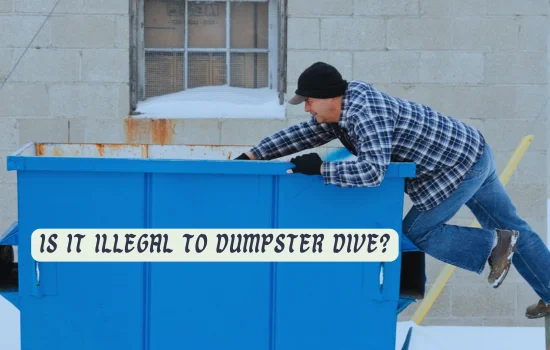The practice of sifting through commercial or residential waste to find items of value—occupies a complex legal space in North Carolina. While no statewide law explicitly prohibits dumpster diving, various legal considerations, including local ordinances, trespassing laws, and public safety concerns, significantly influence its legality. So in today’s article we will dive into is it illegal or not to dumpster dive in North Carolina.
Statewide Legal Framework
In North Carolina, dumpster diving is not expressly forbidden by state law. This aligns with the 1988 U.S. Supreme Court decision in California v. Greenwood, which established that trash left for collection in public areas is not protected by the Fourth Amendment’s guarantee against unreasonable searches and seizures. Consequently, once waste is placed in public spaces for disposal, individuals generally have no reasonable expectation of privacy concerning its contents.
Local Ordinances: A Patchwork of Regulations
Despite the absence of a statewide ban, local governments in North Carolina have enacted ordinances that regulate or prohibit dumpster diving within their jurisdictions. For instance, in Winston-Salem, it is explicitly unlawful for any person to remove wastepaper and garbage from containers placed in private alleys in the business section of the city, except for authorized personnel or those holding a permit from the public works department. Violations can result in a Class 3 misdemeanor and fines of up to $500.
Similarly, in Burlington, unauthorized collection of garbage or refuse is prohibited. The city’s code states that no person, other than those under the direction of the sanitation superintendent, shall haul away or remove any garbage or other refuse set out for collection, except by written consent.
These examples underscore the importance of consulting local regulations before engaging in dumpster diving, as ordinances can vary significantly between municipalities.
Trespassing and Private Property Concerns

Even in areas without specific ordinances against dumpster diving, trespassing laws remain a critical consideration. Entering private property without permission to access a dumpster can lead to trespassing charges. Many businesses maintain their dumpsters in areas considered private property, and unauthorized access may result in legal action. Additionally, tampering with locks or bypassing barriers to access dumpsters is illegal and can lead to fines or arrest.
Public Safety and Disorderly Conduct
Engaging in dumpster diving can also raise public safety concerns. Activities deemed disruptive or offensive may result in disorderly conduct charges. Law enforcement has the authority to issue warnings, citations, or make arrests if they determine that dumpster diving activities compromise public order or safety. Moreover, individuals could face fines for illegal dumping or littering if they leave waste scattered while sorting through trash.
Health Risks and Legal Liabilities
Beyond legal considerations, dumpster diving poses health risks, including exposure to hazardous materials or spoiled food. Individuals injured while dumpster diving may face challenges in seeking legal recourse due to their unauthorized presence on private property. Business owners may also face potential lawsuits if a diver is injured on their property, leading some to enforce strict no-diving policies to mitigate liability.
Identity Theft and Privacy Concerns
An often-overlooked aspect of dumpster diving is the potential for identity theft. Discarded documents containing personal information can be exploited by criminals. In Raleigh, North Carolina, incidents have been reported where individuals retrieved sensitive information from dumpsters, leading to identity theft cases. This highlights the importance of proper disposal methods, such as shredding documents, to protect personal information.
Recent Developments and Community Perspectives
While specific recent lawsuits related to dumpster diving in North Carolina are not prominently documented, community discussions indicate a nuanced perspective on the practice. Some individuals engage in dumpster diving as a means to reduce waste and recover usable items, often adhering to personal guidelines to minimize legal risks, such as avoiding trespassing and leaving areas cleaner than found. However, law enforcement and business owners may view the practice differently due to legal liabilities and safety concerns.
Conclusion
In North Carolina, the legality of dumpster diving is influenced by a combination of state laws, local ordinances, and specific circumstances surrounding each incident. While there is no statewide prohibition, local regulations and property rights play significant roles in determining the legality of dumpster diving. Individuals interested in this activity should thoroughly research local laws, respect private property, and consider the potential health and legal risks involved. Consulting legal professionals or local law enforcement can provide additional guidance tailored to specific locales within North Carolina

